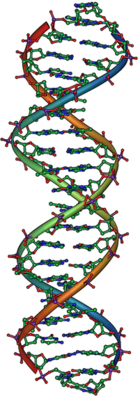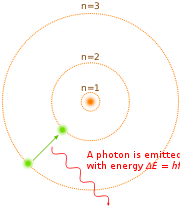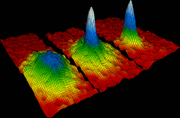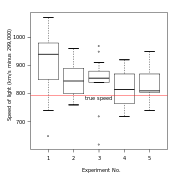
Science
Did you know...
SOS Children made this Wikipedia selection alongside other schools resources. Click here to find out about child sponsorship.

Science (from the Latin scientia, meaning " knowledge") is the effort to discover, understand, or to understand better, how the physical world works, with observable physical evidence as the basis of that understanding. It is done through observation of existing phenomena, and/or through experimentation that tries to simulate phenomena under controlled conditions. Knowledge in science is gained through research.
Etymology

The word science is derived from the Latin word scientia for knowledge, the nominal form of the verb scire, "to know". The Proto-Indo-European (PIE) root that yields scire is *skei-, meaning to "cut, separate, or discern". Other words from the same root include Sanskrit chyati, "he cuts off", Greek schizo, "I split" (hence English schism, schizophrenia), Latin scindo, "I split" (hence English rescind). From the Middle Ages to the Enlightenment, science or scientia meant any systematic recorded knowledge. Science therefore had the same sort of very broad meaning that philosophy had at that time. In other languages, including French, Spanish, Portuguese, and Italian, the word corresponding to science also carries this meaning.
History of science
History of usage of the word science
Well into the eighteenth century, science and natural [philosophy] were not quite synonymous, but only became so later with the direct use of what would become known formally as the scientific method, which was earlier developed during the Middle Ages and early modern period in Europe and the Middle East (see History of scientific method). Prior to the 18th century, however, the preferred term for the study of nature was natural philosophy, while English speakers most typically referred to the study of the human mind as moral philosophy. By contrast, the word "science" in English was still used in the 17th century to refer to the Aristotelian concept of knowledge which was secure enough to be used as a sure prescription for exactly how to do something. In this differing sense of the two words, the philosopher John Locke in An Essay Concerning Human Understanding wrote that "natural philosophy [the study of nature] is not capable of being made a science".
By the early 1800s, natural philosophy had begun to separate from philosophy, though it often retained a very broad meaning. In many cases, science continued to stand for reliable knowledge about any topic, in the same way it is still used in the broad sense (see the introduction to this article) in modern terms such as library science, political science, and computer science. In the more narrow sense of science, as natural philosophy became linked to an expanding set of well-defined laws (beginning with Galileo's laws, Kepler's laws, and Newton's laws for motion), it became more popular to refer to natural philosophy as natural science. Over the course of the nineteenth century, moreover, there was an increased tendency to associate science with study of the natural world (that is, the non-human world). This move sometimes left the study of human thought and society (what would come to be called social science) in a linguistic limbo by the end of the century and into the next.
Through the 19th century, many English speakers were increasingly differentiating science (meaning a combination of what we now term natural and biological sciences) from all other forms of knowledge in a variety of ways. The now-familiar expression “ scientific method,” which refers to the prescriptive part of how to make discoveries in natural philosophy, was almost unused during the early part of the 19th century, but became widespread after the 1870s, though there was rarely totally agreement about just what it entailed. The word "scientist," meant to refer to a systematically-working natural philosopher, (as opposed to an intuitive or empirically-minded one) was coined in 1833 by William Whewell. Discussion of scientists as a special group of people who did science, even if their attributes were up for debate, grew in the last half of the 19th century. Whatever people actually meant by these terms at first, they ultimately depicted science, in the narrow sense of the habitual use of the scientific method and the knowledge derived from it, as something deeply distinguished from all other realms of human endeavor.
By the twentieth century, the modern notion of science as a special brand of information about the world, practiced by a distinct group and pursued through a unique method, was essentially in place. It was used to give legitimacy to a variety of fields through such titles as "scientific" medicine, engineering, advertising, or motherhood. Over the 1900s, links between science and technology also grew increasingly strong.
Distinguished from technology
By the end of the century, it is arguable that technology had even begun to eclipse science as a term of public attention and praise. Scholarly studies of science have begun to refer to " technoscience" rather than science of technology separately. Meanwhile, such fields as biotechnology and nanotechnology are capturing the headlines. One author has suggested that, in the coming century, "science" may fall out of use, to be replaced by technoscience or even by some more exotic label such as "techknowledgy."
Scientific method

The scientific method seeks to explain the events of nature in a reproducible way, and to use these reproductions to make useful predictions. It is done through observation of natural phenomena, and/or through experimentation that tries to simulate natural events under controlled conditions. It provides an objective process to find solutions to problems in a number of scientific and technological fields.
Based on observations of a phenomenon, a scientist may generate a model. This is an attempt to describe or depict the phenomenon in terms of a logical physical or mathematical representation. As empirical evidence is gathered, a scientist can suggest a hypothesis to explain the phenomenon. This description can be used to make predictions that are testable by experiment or observation using the scientific method. When a hypothesis proves unsatisfactory, it is either modified or discarded.
While performing experiments, Scientists may have a preference for one outcome over another, and it is important that this tendency does not bias their interpretation. A strict following of the scientific method attempts to minimize the influence of a scientist's bias on the outcome of an experiment. This can be achieved by correct experimental design, and a thorough peer review of the experimental results as well as conclusions of a study. Once the experiment results are announced or published, an important cross-check can be the need to validate the results by an independent party.
Once a hypothesis has survived testing, it may become adopted into the framework of a scientific theory. This is a logically reasoned, self-consistent model or framework for describing the behavior of certain natural phenomena. A theory typically describes the behaviour of much broader sets of phenomena than a hypothesis—commonly, a large number of hypotheses can be logically bound together by a single theory. These broader theories may be formulated using principles such as parsimony (e.g., " Occam's Razor"). They are then repeatedly tested by analyzing how the collected evidence ( facts) compares to the theory. When a theory survives a sufficiently large number of empirical observations, it then becomes a scientific generalization that can be taken as fully verified. These assume the status of a physical law or law of nature.
Despite the existence of well-tested theories, science cannot claim absolute knowledge of nature or the behaviour of the subject or of the field of study due to epistemological problems that are unavoidable and preclude the discovery or establishment of absolute truth. Unlike a mathematical proof, a scientific theory is empirical, and is always open to falsification, if new evidence is presented. Even the most basic and fundamental theories may turn out to be imperfect if new observations are inconsistent with them. Critical to this process is making every relevant aspect of research publicly available, which allows ongoing review and repeating of experiments and observations by multiple researchers operating independently of one another. Only by fulfilling these expectations can it be determined how reliable the experimental results are for potential use by others.
Isaac Newton's Newtonian law of gravitation is a famous example of an established law that was later found not to be universal—it does not hold in experiments involving motion at speeds close to the speed of light or in close proximity of strong gravitational fields. Outside these conditions, Newton's Laws remain an excellent model of motion and gravity. Since general relativity accounts for all the same phenomena that Newton's Laws do and more, general relativity is now regarded as a more comprehensive theory.
Mathematics
Mathematics is essential to many sciences. One important function of mathematics in science is the role it plays in the expression of scientific models. Observing and collecting measurements, as well as hypothesizing and predicting, often require extensive use of mathematics and mathematical models. Calculus may be the branch of mathematics most often used in science, but virtually every branch of mathematics has applications in science, including "pure" areas such as number theory and topology. Mathematics is fundamental to the understanding of the natural sciences and the social sciences, many of which also rely heavily on statistics.
Statistical methods, comprised of mathematical techniques for summarizing and exploring data, allow scientists to assess the level of reliability and the range of variation in experimental results. Statistical thinking also plays a fundamental role in many areas of science.
Computational science applies computing power to simulate real-world situations, enabling a better understanding of scientific problems than formal mathematics alone can achieve. According to the Society for Industrial and Applied Mathematics, computation is now as important as theory and experiment in advancing scientific knowledge.
Whether mathematics itself is properly classified as science has been a matter of some debate. Some thinkers see mathematicians as scientists, regarding physical experiments as inessential or mathematical proofs as equivalent to experiments. Others do not see mathematics as a science, since it does not require experimental test of its theories and hypotheses. In practice, mathematical theorems and formulas are obtained by logical derivations which presume axiomatic systems, rather than a combination of empirical observation and method of reasoning that has come to be known as scientific method. In general, mathematics is classified as formal science, while natural and social sciences are classified as empirical sciences.
Philosophy of science

The philosophy of science seeks to understand the nature and justification of scientific knowledge. It has proven difficult to provide a definitive account of the scientific method that can decisively serve to distinguish science from non-science. Thus there are legitimate arguments about exactly where the borders are, leading to the problem of demarcation. There is nonetheless a set of core precepts that have broad consensus among published philosophers of science and within the scientific community at large.
Science is reasoned-based analysis of sensation upon our awareness. As such, the scientific method cannot deduce anything about the realm of reality that is beyond what is observable by existing or theoretical means. When a manifestation of our reality previously considered supernatural is understood in the terms of causes and consequences, it acquires a scientific explanation.
Some of the findings of science can be very counter-intuitive. Atomic theory, for example, implies that a granite boulder which appears a heavy, hard, solid, grey object is actually a combination of subatomic particles with none of these properties, moving very rapidly in space where the mass is concentrated in a very small fraction of the total volume. Many of humanity's preconceived notions about the workings of the universe have been challenged by new scientific discoveries. Quantum mechanics, particularly, examines phenomena that seem to defy our most basic postulates about causality and fundamental understanding of the world around us. Science is the branch of knowledge dealing with people and the understanding we have of our environment and how it works.
There are different schools of thought in the philosophy of scientific method. Methodological naturalism maintains that scientific investigation must adhere to empirical study and independent verification as a process for properly developing and evaluating natural explanations for observable phenomena. Methodological naturalism, therefore, rejects supernatural explanations, arguments from authority and biased observational studies. Critical rationalism instead holds that unbiased observation is not possible and a demarcation between natural and supernatural explanations is arbitrary; it instead proposes falsifiability as the landmark of empirical theories and falsification as the universal empirical method. Critical rationalism argues for the ability of science to increase the scope of testable knowledge, but at the same time against its authority, by emphasizing its inherent fallibility. It proposes that science should be content with the rational elimination of errors in its theories, not in seeking for their verification (such as claiming certain or probable proof or disproof; both the proposal and falsification of a theory are only of methodological, conjectural, and tentative character in critical rationalism). Instrumentalism rejects the concept of truth and emphasizes merely the utility of theories as instruments for explaining and predicting phenomena.
Critiques
Science, pseudoscience and nonscience
Any established body of knowledge which masquerades as science in an attempt to claim a legitimacy which it would not otherwise be able to achieve on its own terms is not science; it is often known as fringe- or alternative science. The most important of its defects is usually the lack of the carefully controlled and thoughtfully interpreted experiments which provide the foundation of the natural sciences and which contribute to their advancement. Another term, junk science, is often used to describe scientific theories or data which, while perhaps legitimate in themselves, are believed to be mistakenly used to support an opposing position. There is usually an element of political or ideological bias in the used of the term. Thus the arguments in favour of limiting the use of fossil fuels in order to reduce global warming are often characterized as junk science by those who do not wish to see such restrictions imposed, and who claim that other factors may well be the cause of global warming. A wide variety of commercial advertising (ranging from hype to outright fraud) would also fall into this category. Finally, there is just plain bad science, which is commonly used to describe well-intentioned but incorrect, obsolete, incomplete, or over-simplified expositions of scientific ideas.
The status of many bodies of knowledge as true sciences, has been a matter of debate. Discussion and debate abound in this topic with some fields like the social and behavioural sciences accused by critics of being unscientific. Many groups of people from academicians like Nobel Prize physicist Percy W. Bridgman, or Dick Richardson, Ph.D.—Professor of Integrative Biology at the University of Texas at Austin, to politicians like U.S. Senator Kay Bailey Hutchison and other co-sponsors, oppose giving their support or agreeing with the use of the label "science" in some fields of study and knowledge they consider non-scientific, ambiguous, or scientifically irrelevant compared with other fields. Karl Popper denied the existence of evidence and of scientific method. Popper holds that there is only one universal method, the negative method of trial and error. It covers not only all products of the human mind, including science, mathematics, philosophy, art and so on, but also the evolution of life. He also contributed to the Positivism dispute, a philosophical dispute between Critical rationalism (Popper, Albert) and the Frankfurt School (Adorno, Habermas) about the methodology of the social sciences.
Philosophical focus
Historian Jacques Barzun termed science "a faith as fanatical as any in history" and warned against the use of scientific thought to suppress considerations of meaning as integral to human existence. Many recent thinkers, such as Carolyn Merchant, Theodor Adorno and E. F. Schumacher considered that the 17th century scientific revolution shifted science from a focus on understanding nature, or wisdom, to a focus on manipulating nature, i.e. power, and that science's emphasis on manipulating nature leads it inevitably to manipulate people, as well. Science's focus on quantitative measures has led to critiques that it is unable to recognize important qualitative aspects of the world.
The implications of the ideological denial of ethics for the practice of science itself in terms of fraud, plagiarism, and data falsification, has been criticized by several academics. In "Science and Ethics", the philosopher Bernard Rollin examines the ideology that denies the relevance of ethics to science, and argues in favour of making education in ethics part and parcel of scientific training.
Epistemological inadequacies
Psychologist Carl Jung believed that though science attempted to understand all of nature, the experimental method used would pose artificial, conditional questions that evoke only partial answers. Robert Anton Wilson criticized science for using instruments to ask questions that produce answers only meaningful in terms of the instrument, and that there was no such thing as a completely objective vantage point from which to view the results of science.
Scientific community
The scientific community consists of the total body of scientists, its relationships and interactions. It is normally divided into "sub-communities" each working on a particular field within science.
Fields
Fields of science are commonly classified along two major lines: natural sciences, which study natural phenomena (including biological life), and social sciences, which study human behaviour and societies. These groupings are empirical sciences, which means the knowledge must be based on observable phenomena and capable of being experimented for its validity by other researchers working under the same conditions. There are also related disciplines that are grouped into interdisciplinary and applied sciences, such as engineering and health science. Within these categories are specialized scientific fields that can include elements of other scientific disciplines but often possess their own terminology and body of expertise.
Mathematics, which is sometimes classified within a third group of science called formal science, has both similarities and differences with the natural and social sciences. It is similar to empirical sciences in that it involves an objective, careful and systematic study of an area of knowledge; it is different because of its method of verifying its knowledge, using a priori rather than empirical methods. Formal science, which also includes statistics and logic, is vital to the empirical sciences. Major advances in formal science have often led to major advances in the physical and biological sciences. The formal sciences are essential in the formation of hypotheses, theories, and laws, both in discovering and describing how things work (natural sciences) and how people think and act (social sciences).
Institutions
Learned societies for the communication and promotion of scientific thought and experimentation have existed since the Renaissance period. The oldest surviving institution is the Accademia dei Lincei in Italy. National Academy of Sciences are distinguished institutions that exist in a number of countries, beginning with the British Royal Society in 1660 and the French Académie des Sciences in 1666.
International scientific organizations, such as the International Council for Science, have since been formed to promote cooperation between the scientific communities of different nations. More recently, influential government agencies have been created to support scientific research, including the National Science Foundation in the U.S.
Other prominent organizations include the academies of science of many nations, CSIRO in Australia, Centre national de la recherche scientifique in France, Max Planck Society and Deutsche Forschungsgemeinschaft in Germany, and in Spain, CSIC.
Literature
An enormous range of scientific literature is published. Scientific journals communicate and document the results of research carried out in universities and various other research institutions, serving as an archival record of science. The first scientific journals, Journal des Sçavans followed by the Philosophical Transactions, began publication in 1665. Since that time the total number of active periodicals has steadily increased. As of 1981, one estimate for the number of scientific and technical journals in publication was 11,500.
Most scientific journals cover a single scientific field and publish the research within that field; the research is normally expressed in the form of a scientific paper. Science has become so pervasive in modern societies that it is generally considered necessary to communicate the achievements, news, and ambitions of scientists to a wider populace.
Science magazines such as New Scientist and Scientific American cater to the needs of a much wider readership and provide a non-technical summary of popular areas of research, including notable discoveries and advances in certain fields of research. Science books engage the interest of many more people. Tangentially, the science fiction genre, primarily fantastic in nature, engages the public imagination and transmits the ideas, if not the methods, of science.
Recent efforts to intensify or develop links between science and non-scientific disciplines such as Literature or, more specifically, Poetry, include the Creative Writing <-> Science resource developed through the Royal Literary Fund.


